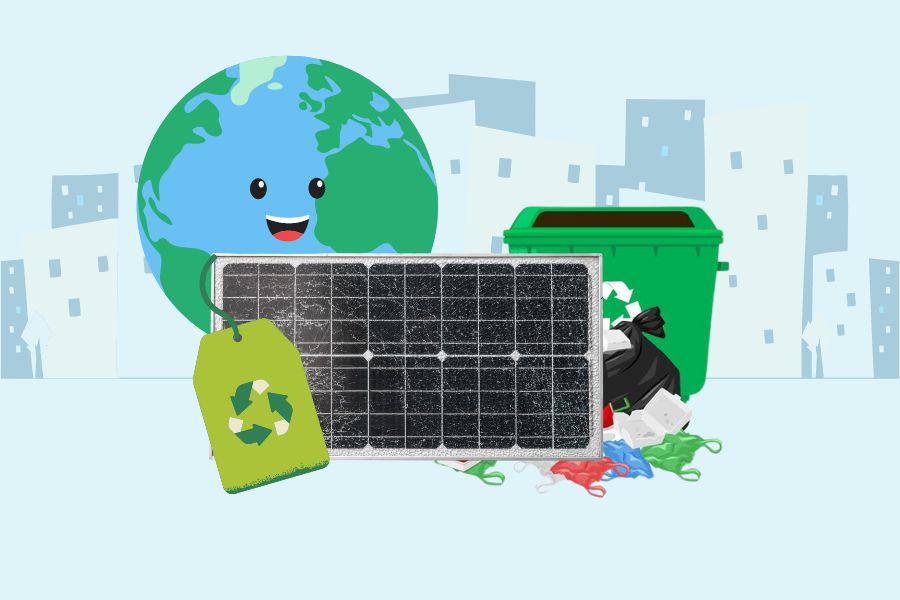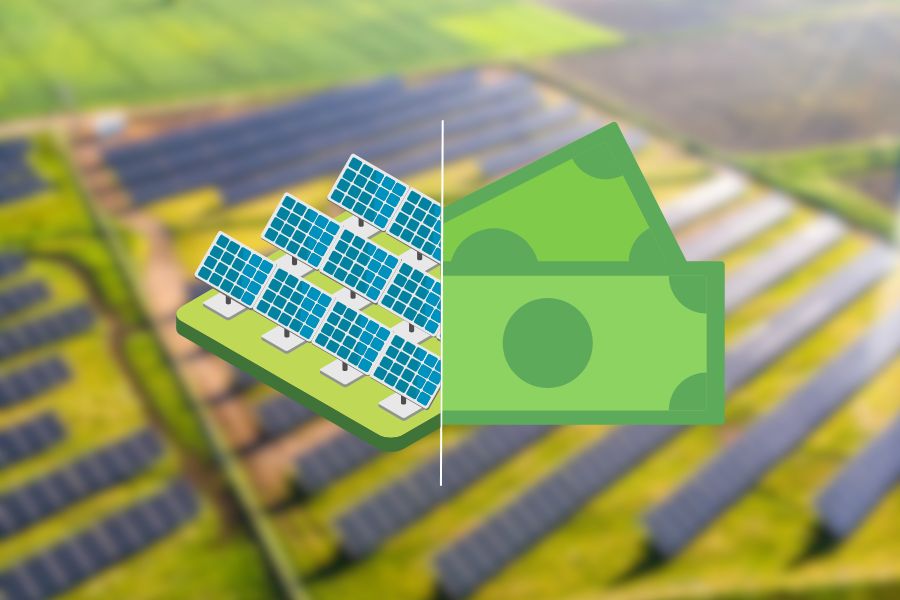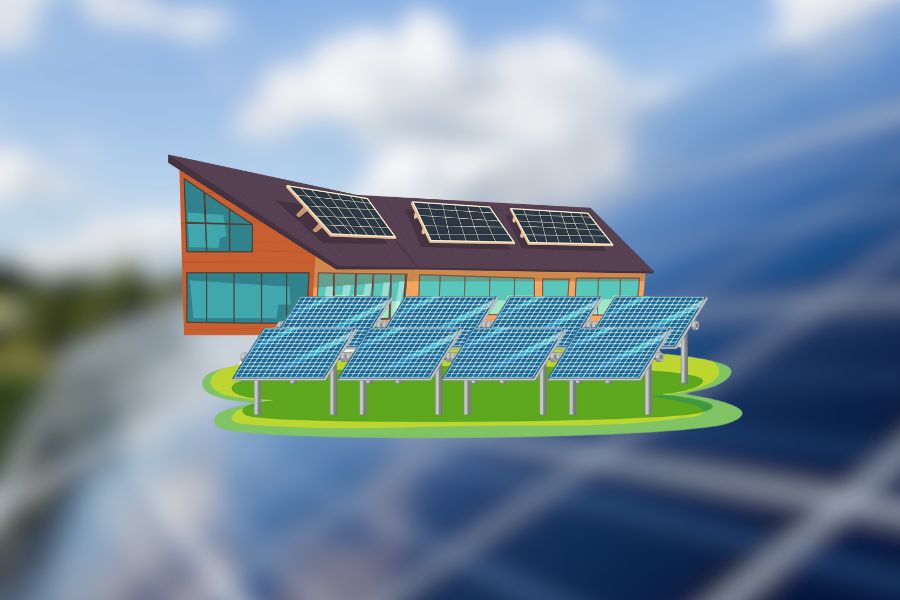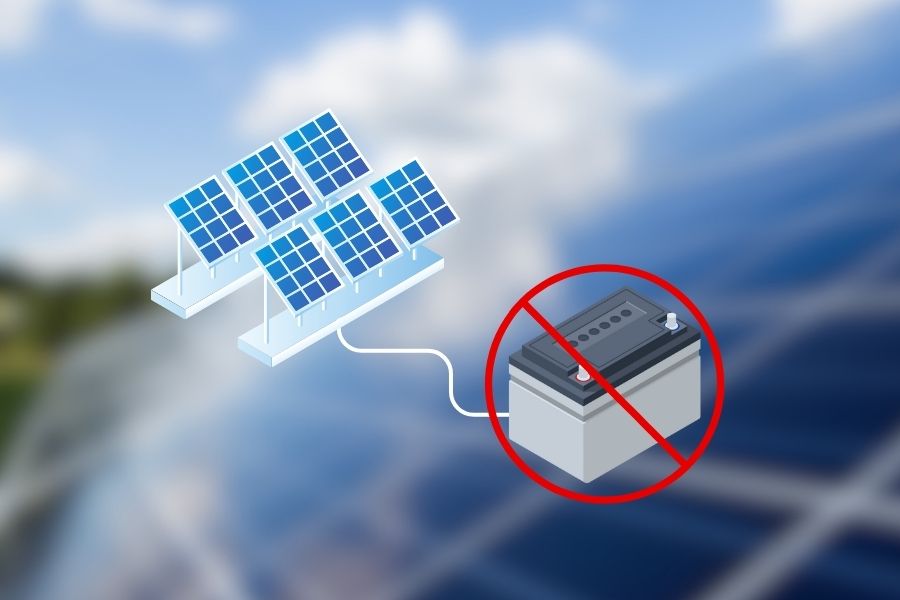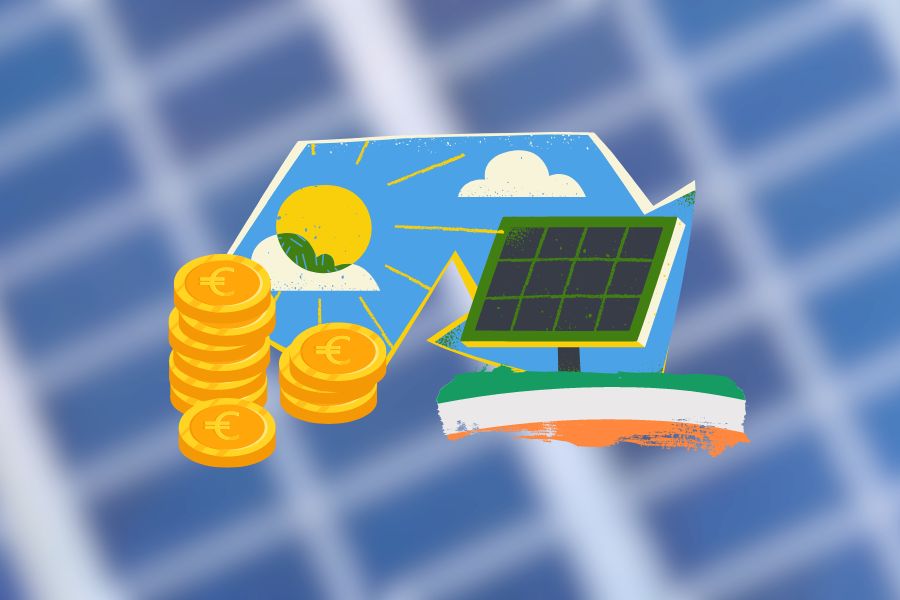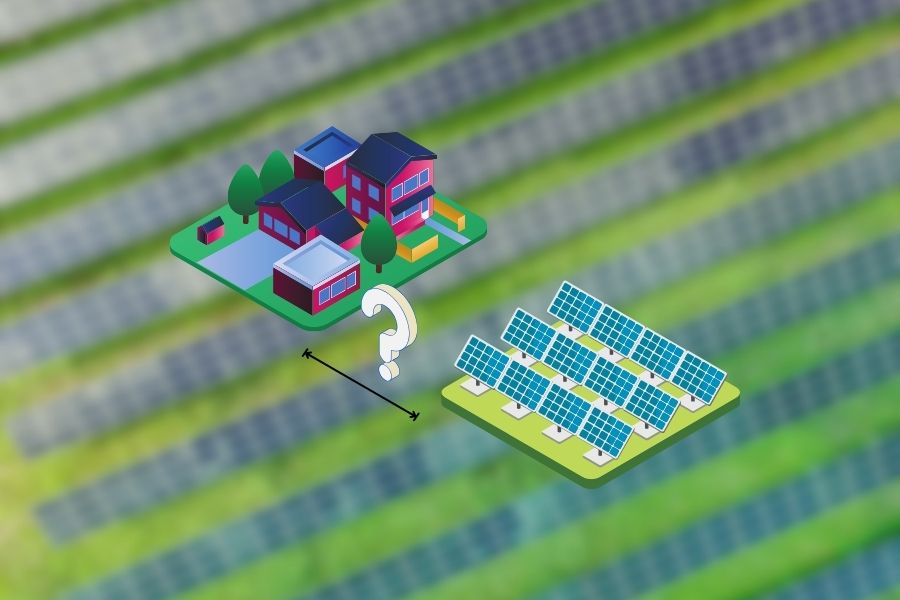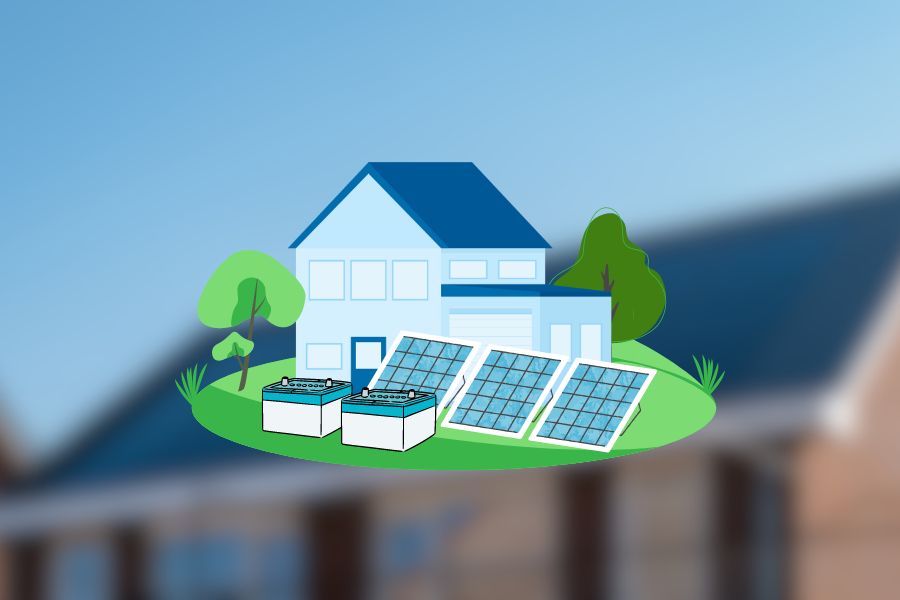Solar panel recycling in Ireland offers a sustainable solution to manage end-of-life solar panels, ensuring valuable materials are reused, and hazardous waste is safely disposed of. This process involves disassembling the panels, extracting and purifying valuable components like silicon, silver, and aluminum, and repurposing these materials for new solar panels or other industries.
Can Solar Panels Be Recycled?
Yes, solar panels can be recycled! The National Renewable Energy Laboratory (NREL) and the International Renewable Energy Agency (IREA) have emphasized properly recycling solar panels.
The recycling process for solar panels involves separating and recovering raw materials, including the valuable metals in solar cells, such as silicon and silver. These valuable materials can help produce new solar panels or other electronic devices.
While the recycling process for commercial solar panels can be more challenging due to their size and the presence of hazardous materials such as lead and cadmium, there are companies specializing in recycling solar panels, and the technology for recycling these panels is advancing rapidly.
Recycling also has the potential to significantly reduce the environmental impact of solar panel production, as recycled materials require less energy to produce than raw materials. Therefore, recycled solar panels ensure a sustainable and responsible approach to renewable energy.
How Recycling Solar Panels Works
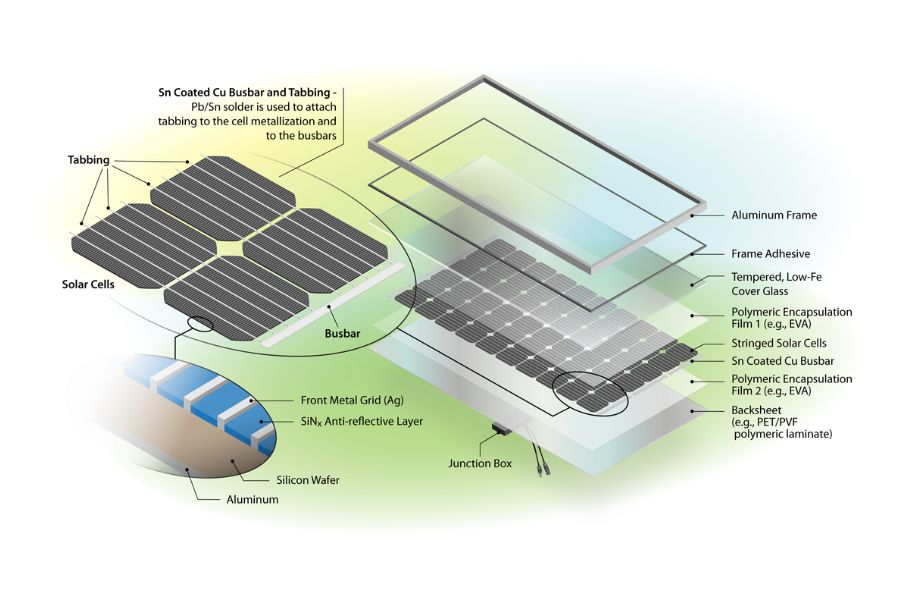
Photovoltaic (PV) cells are the building blocks of solar panels. They consist of semiconducting materials, such as silicon, which can absorb sunlight and convert it into direct current (DC) electricity.
When sunlight hits the PV cell, it excites electrons, moving from its negative to its positive side. This flow of electrons creates a current, which one can use as electricity.
There are two main types of solar PV panels: crystalline silicon and thin film. Crystalline silicon panels are made of slices of silicon wafers and are the most common type of solar panel.
Thin-film panels, on the other hand, are made by depositing a thin layer of photovoltaic material onto a substrate, such as glass or metal. As a result, thin-film panels are typically less efficient than crystalline silicon panels, but they are also less expensive to produce.
Solar panels also consist of other components, including:
- Encapsulation Material: Protects the PV cells from moisture and other environmental factors.
- Backsheet: This layer provides structural support and protects the panel from damage.
- Junction Box: This box contains the electrical connections and helps manage the electricity flow from the panel.
When solar panels end their useful life, one can recycle them. Recycling involves separating the panels into glass, plastic, and silicon components. One can reuse these materials to create new solar panels or other products. Recycling solar panels helps to reduce waste and conserve natural resources.
The Lifetime of Solar Panels
The lifetime of solar panels is typically around 25-30 years, but they can last longer with proper maintenance. When decommissioned, solar panels are considered electronic waste and are subject to regulations under the European Union’s electronic equipment directive. This directive requires the disposal of decommissioned solar panels in an environmentally responsible manner.
One way to dispose of solar panels is through recycling. First, you dismantle the panels at a recycling plant, and the components, such as glass, metal, and silicon, are separated and processed. Then, one can reuse the recovered materials to manufacture new solar panels or other products.
Recycling solar panels not only helps to reduce waste but also conserves natural resources. Additionally, it can reduce the environmental impact of manufacturing new solar panels, as recycling requires less energy and resources than producing new panels from scratch. Therefore, recycling solar panel waste is essential to ensuring the sustainability of the solar energy industry.
The Importance of Solar Panel Recycling
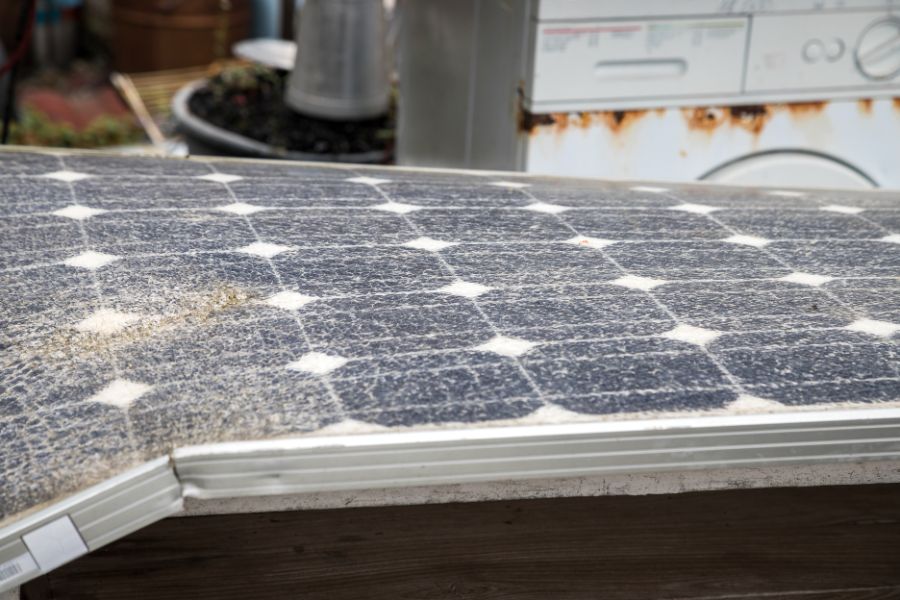
One of the leading environmental benefits of recycling solar panels is that it can help reduce the amount of waste in landfills.
Solar panel waste can harm the environment because it contains toxic chemicals such as lead and cadmium, which can leach into the soil and water if improperly disposed of.
Recycling these panels can prevent the release of these harmful substances and reduce the environmental impact of solar panel production.
In addition to environmental benefits, recycling solar panels can also have economic benefits. Recycling can help recover valuable materials such as silicon, copper, and silver. One can reuse them to produce new solar panels. It can reduce the cost of building new panels and make them more affordable for consumers.
Despite these benefits, there are still challenges in the current solar panel recycling industry. One of the main challenges is the lack of infrastructure and policies that support solar panel recycling.
It has led to a relatively low rate of solar panel recycling, with most panels still ending up in landfills. Another challenge is the high cost of recycling, which can make it difficult for recycling companies to compete with cheaper landfill disposal options.
Silicon Based Solar Panel Recycling
Silicon-based solar panels are the market’s most commonly used type today. However, as with any electronic device, these panels will eventually end their useful life. Therefore, it is important to recycle them properly to prevent them from becoming a source of environmental pollution.
The process of recycling silicon-based solar panels involves several steps. The first step is to collect and sort the panels according to their type, age, and condition. It helps to ensure that you correctly handle the panels and that valuable materials are well-spent.
Once the panels have been collected and sorted, you break them down into individual components. You do that using a combination of mechanical and chemical processes. First, one shreds the panels into small pieces, separating the different materials, such as glass, plastic, and metal.
One of the critical materials recovered during the recycling process is silicon. This material is valuable because one can reuse it to produce new solar panels.
By recovering and reusing this material, one can reduce the environmental impact of solar panel production.
In addition to silicon, one can recover other valuable materials such as copper, aluminum, and silver during recycling. You can sell these materials to manufacturers and help offset the cost of recycling.
Government Regulations and Policies in Ireland
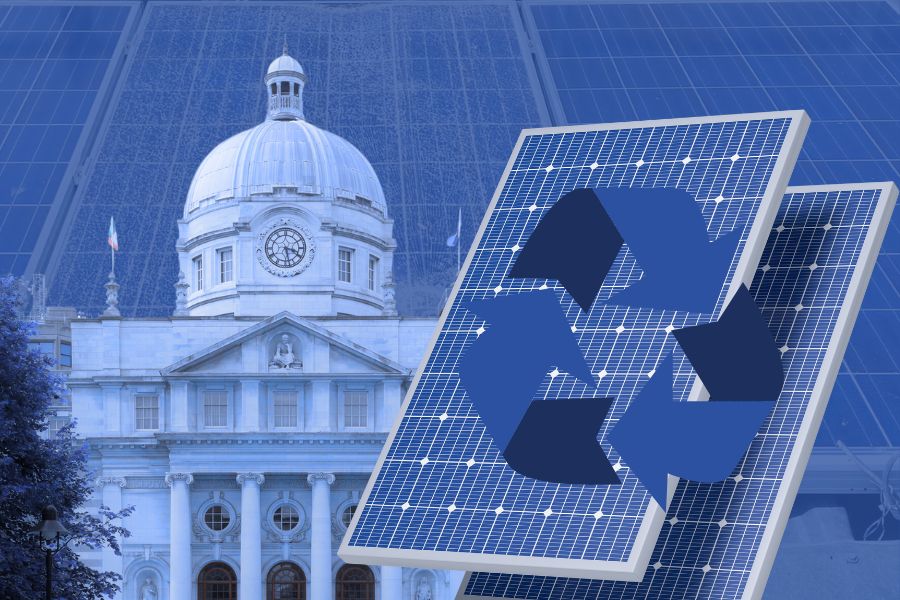
The government has also recognized the importance of responsible solar panel disposal and recycling in Ireland. While there are no specific solar panel recycling regulations, several policies and initiatives are in place to encourage sustainable practices.
Under the Waste Management Act of 1996, businesses and households must dispose of their waste in an environmentally responsible manner.
It includes ensuring that solar panels are disposed of properly and not simply thrown in the trash. In addition, the government has established a National Hazardous Waste Management Plan, which outlines strategies for managing hazardous waste, including solar panel waste.
The government has also implemented various policies and initiatives to promote renewable energy, including solar power. These policies increase the adoption of renewable energy and reduce greenhouse gas emissions.
For example, the Renewable Energy Support Scheme provides financial support to renewable energy projects, including solar power installations.
On an international level, Ireland has signed several agreements and initiatives to promote responsible solar panel recycling. In addition, Ireland is a signatory to the Basel Convention, which regulates the global movement of hazardous waste.
This convention aims to prevent the transfer of hazardous waste from developed to developing countries and encourages the environmentally sound management of hazardous waste, including solar panel waste.
Furthermore, Ireland is a member of the European Union (EU), which has implemented a range of directives related to waste management, including the Waste Electrical and Electronic Equipment (WEEE) Directive. This directive requires member states to ensure that electronic waste, including solar panels, is collected and recycled environmentally.
Conclusion
The importance of solar panel recycling cannot be overstated. Recycling helps to reduce the environmental impact of solar panel waste, conserve valuable resources, and promote sustainable practices.
Governments worldwide have recognized the importance of responsible solar panel disposal and have implemented policies and initiatives to encourage recycling.
As individuals, we can do our part by ensuring that our solar panels are disposed of in an environmentally responsible manner. It may involve contacting a local recycling center or the manufacturer for proper disposal guidance.
Technological innovation will likely play an essential role in improving the efficiency and sustainability of solar panel recycling in the future. As the demand for solar power continues to grow, we must continue to invest in research and development to improve the recycling process and reduce the environmental impact of solar panel waste.
In summary, we must all work together to ensure that solar panel waste is recycled responsibly and sustainably. Doing so can help protect the environment, conserve valuable resources, and promote a cleaner and more sustainable future.
